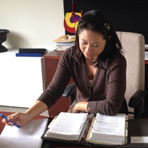Oracle v Google
“Trials are so sensational.” “Jury duty is a drag.” “Famous people pay their way to justice.”
Our complaints demonstrate how we take our open system for granted. Not without reason, unfortunately: Participation in the legal system is demanding, not well compensated ($15/day!) and disruptive. I would not want, could not afford to and would be completely stressed out by sitting on a jury for eight weeks.
However, it wasn’t me in the jury box so, along with my close litigator friend who advised me on the finer points, I sat back to enjoy Day 2 of Oracle v. Google. The Peninsula giants faced off in the United States District Court for Northern California and conducted very well executed trial.
Very well executed. Excuse my pop culture references but if you’ve never seen a trial, you’re apt to imagine courtroom scenes from shows like Law & Order. This trial dwarfed any set from that show. Where the TV attorneys are seated at a picnic tables before the judge, the cliques of Oracle and Google attorneys sat at tables from Harry Potter’s dining hall scenes.
A bank of technology experts orchestrated evidence so that, at the mere mention of a line from a deposition, the corresponding video footage appeared on a monitor positioned for each juror and on large screens provided for the room.
The attorneys were prepared and poised. Judge Alsup ran an efficient courtroom, moving the proceedings along briskly but also with very gentle conversations with the jury, making sure they kept up.
And so on and so on. As members of the public, we don’t have to pay an admission fee to observe these proceedings. As litigants, we don’t have to pay the system to participate and, unlike our European counterparts, each side almost always pay their own legal bills. (For better or worse, anyone can file a claim.)
The fact that we all have access to trials every day in every county, even for a dispute of this scale, motivated me to write this blog post, to encourage visiting once in a while. See your tax dollars at work.
On the other hand, the fact that we pluck strangers out of their lives, hand them expert level information that they previously held no inclination to research on their own, have them make decisions on it, to then potentially and very possibly significantly impact the lives of other people . . .. It’s mad.
It might have worked better in simpler times, over disputes involving relateable subject matter like wayward chicken and property lines.
I know. This is a technology case; I’m an IP attorney. Wayward chicken???
The details are clear enough in the news reports. As interesting as this case is from legal and technological perspectives, it also illustrates our wider struggle to keep up with Life, which, as ever, outpaces our processes.
Everyone in that room, even the Oracle attorneys, has used Google. This case exemplifies how we can have familiarity of a subject matter, yet not the expertise to judge it. In a world of ever-expanding knowledge, this is going to continue as information grows specialized. We have learned from the unprecedented transparency encouraged in every sector of our economy. As consumers, we are already more sophisticated than we were a mere five years ago but jury duty is a very important pop quiz with high stakes.
Can we keep up with the challenge?
In any case, from what I’ve read of the trial so far, the jury verdicts are confusing. Given what we know of our system, though, it’s not that surprising.

Leave a Reply